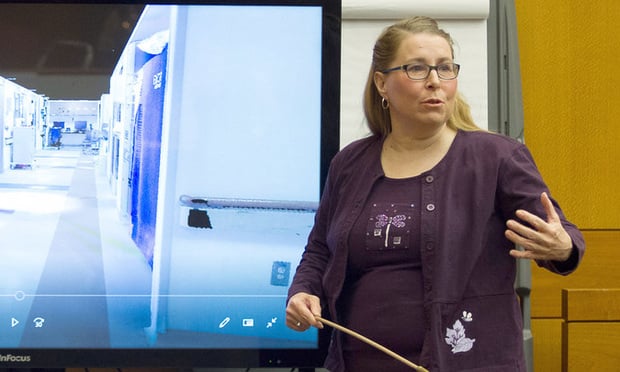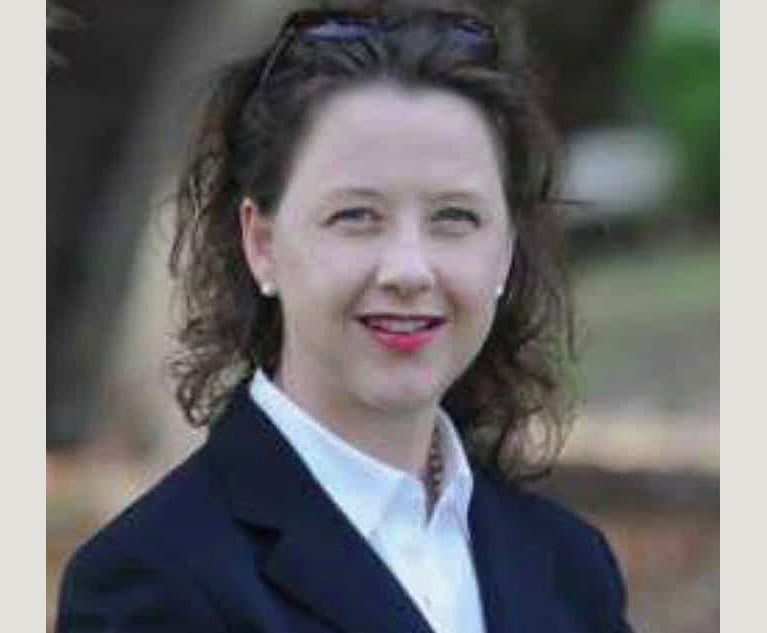ER Nurse Testifies Tex McIver Huddled With Lawyer as His Wife Was Dying
Terri Sullivan, an emergency room nurse at Emory University Hospital in Atlanta, testified that, when she learned Diane McIver had been shot, she was "suspicious there had been foul play."
March 16, 2018 at 03:49 PM
4 minute read

An emergency room nurse on duty the night Diane McIver died of a gunshot wound testified Friday that she overheard a lawyer tell the woman's husband, Atlanta attorney Claud “Tex” McIver, “This is what you're going to tell them.”
“I had the impression there was a plan being enacted,” Emory University Hospital ER nurse Terri Sullivan said. Tex McIver, a woman wearing a cowboy hat she identified as family friend Dani Jo Carter and a man carrying a legal pad that prosecutors have identified as McIver's attorney, Stephen Maples, “were kind of huddling like … a sports team, kind of holding on in a small circle,” she said.
Sullivan is the fifth Emory ER nurse to testify at Tex McIver's ongoing murder trial. The lawyer, now retired from Atlanta's Fisher & Phillips, is charged with malice murder, felony murder and multiple counts of influencing witnesses stemming from Diane McIver's shooting on Sept. 25, 2016. She died hours after McIver shot her in the couple's SUV as Carter drove them home. McIver has always said the shooting was an accident.
McIver and his representatives have given multiple explanations about how the gun went off, including that McIver had apparently fallen asleep, that the gun discharged when the SUV hit a bump in the road, even though it was stopped at a traffic light, and that he just didn't remember.
Prosecutors claim he had a financial motive.
Sullivan testified Friday that Emory ER personnel, herself included, were suspicious of the circumstances surrounding the shooting, which allegedly occurred on Piedmont Avenue near 12th Street.
Sullivan said she was so concerned about what she overheard that she asked another nurse to keep tabs on the group “to see what she could hear either to corroborate what I had heard or to see further whether there was an inappropriate discussion going on.”
Sullivan said that, after Diane McIver died in the hospital early on Sept. 26, 2016, Tex McIver checked into the ER, complaining of an anxiety attack. Sullivan, who treated him, said Tex McIver did not appear dazed.
She described him as “calm and cooperative. … He was speaking in a very calm manner. He was not crying. There were no tears.”
McIver told her he needed “something to help me cope,” Sullivan said. His wife, he explained, “had died unexpectedly.”
In listing chronic medical conditions, McIver, she said, never mentioned he had a sleep disorder or that he occasionally suffered from amnesia. Within an hour of being triaged and seen by an ER physician, McIver was dismissed with one tablet of Ativan, an anti-anxiety drug, and four tabs of Xanax.
But, while Diane McIver was being treated, ER personnel were already comparing her husband to O.J. Simpson—who was charged and later acquitted of murder in a sensational trial in the mid-1990s for the death of his wife, Nicole, and a male friend.
“We were all just feeling such a sense of shock,” Sullivan said. “Some of us were angry that clearly someone had shot her and clearly it was an unfair situation.”
“People were talking about it because … he was a high-profile person with a lot of money,” Sullivan testified
Sullivan also confirmed she told prosecutors “Nobody with a gunshot would ever come to Emory.” Emory is not a trauma center and would divert ambulances with gunshot victims either to Grady Memorial Hospital or Atlanta Medical Center in downtown Atlanta, she added.
Both hospitals were closer to the street near Piedmont Park where Diane McIver was shot than Emory, where Tex McIver directed Carter to take his wife.
“I thought it was suspicious that a gunshot would come to Emory, yes,” Sullivan said. “When I saw the group huddled around, [and heard] 'This is what you're going to tell them,' then I started to be suspicious there was significant foul play … that there was something amiss.”
This content has been archived. It is available through our partners, LexisNexis® and Bloomberg Law.
To view this content, please continue to their sites.
Not a Lexis Subscriber?
Subscribe Now
Not a Bloomberg Law Subscriber?
Subscribe Now
NOT FOR REPRINT
© 2025 ALM Global, LLC, All Rights Reserved. Request academic re-use from www.copyright.com. All other uses, submit a request to [email protected]. For more information visit Asset & Logo Licensing.
You Might Like
View All
Man Charged in Daylong Shooting Rampage in Memphis Is Serving as His Own Lawyer

Judge Orders Acquittal of Ex-Prosecutor on 1 of 2 Counts in Misconduct Trial Over Ahmaud Arbery Case
3 minute read
Did Ahmaud Arbery's Killers Get Help From Glynn County DA? Jury Hears Clashing Accounts

Jury Seated in Glynn County Trial of Ex-Prosecutor Accused of Shielding Ahmaud Arbery's Killers
Trending Stories
- 1Public Notices/Calendars
- 2Wednesday Newspaper
- 3Decision of the Day: Qui Tam Relators Do Not Plausibly Claim Firm Avoided Tax Obligations Through Visa Applications, Circuit Finds
- 4Judicial Ethics Opinion 24-116
- 5Big Law Firms Sheppard Mullin, Morgan Lewis and Baker Botts Add Partners in Houston
Who Got The Work
J. Brugh Lower of Gibbons has entered an appearance for industrial equipment supplier Devco Corporation in a pending trademark infringement lawsuit. The suit, accusing the defendant of selling knock-off Graco products, was filed Dec. 18 in New Jersey District Court by Rivkin Radler on behalf of Graco Inc. and Graco Minnesota. The case, assigned to U.S. District Judge Zahid N. Quraishi, is 3:24-cv-11294, Graco Inc. et al v. Devco Corporation.
Who Got The Work
Rebecca Maller-Stein and Kent A. Yalowitz of Arnold & Porter Kaye Scholer have entered their appearances for Hanaco Venture Capital and its executives, Lior Prosor and David Frankel, in a pending securities lawsuit. The action, filed on Dec. 24 in New York Southern District Court by Zell, Aron & Co. on behalf of Goldeneye Advisors, accuses the defendants of negligently and fraudulently managing the plaintiff's $1 million investment. The case, assigned to U.S. District Judge Vernon S. Broderick, is 1:24-cv-09918, Goldeneye Advisors, LLC v. Hanaco Venture Capital, Ltd. et al.
Who Got The Work
Attorneys from A&O Shearman has stepped in as defense counsel for Toronto-Dominion Bank and other defendants in a pending securities class action. The suit, filed Dec. 11 in New York Southern District Court by Bleichmar Fonti & Auld, accuses the defendants of concealing the bank's 'pervasive' deficiencies in regards to its compliance with the Bank Secrecy Act and the quality of its anti-money laundering controls. The case, assigned to U.S. District Judge Arun Subramanian, is 1:24-cv-09445, Gonzalez v. The Toronto-Dominion Bank et al.
Who Got The Work
Crown Castle International, a Pennsylvania company providing shared communications infrastructure, has turned to Luke D. Wolf of Gordon Rees Scully Mansukhani to fend off a pending breach-of-contract lawsuit. The court action, filed Nov. 25 in Michigan Eastern District Court by Hooper Hathaway PC on behalf of The Town Residences LLC, accuses Crown Castle of failing to transfer approximately $30,000 in utility payments from T-Mobile in breach of a roof-top lease and assignment agreement. The case, assigned to U.S. District Judge Susan K. Declercq, is 2:24-cv-13131, The Town Residences LLC v. T-Mobile US, Inc. et al.
Who Got The Work
Wilfred P. Coronato and Daniel M. Schwartz of McCarter & English have stepped in as defense counsel to Electrolux Home Products Inc. in a pending product liability lawsuit. The court action, filed Nov. 26 in New York Eastern District Court by Poulos Lopiccolo PC and Nagel Rice LLP on behalf of David Stern, alleges that the defendant's refrigerators’ drawers and shelving repeatedly break and fall apart within months after purchase. The case, assigned to U.S. District Judge Joan M. Azrack, is 2:24-cv-08204, Stern v. Electrolux Home Products, Inc.
Featured Firms
Law Offices of Gary Martin Hays & Associates, P.C.
(470) 294-1674
Law Offices of Mark E. Salomone
(857) 444-6468
Smith & Hassler
(713) 739-1250






